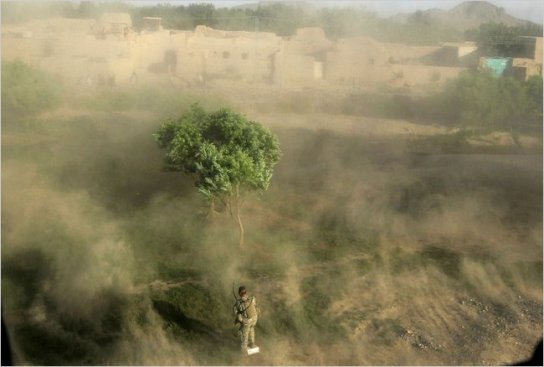
A soldier shielded himself from dust as an Army helicopter took off after picking up wounded Afghan National Army soldiers near Kandahar, Afghanistan
General Faces Unease Among His Own Troops, Too
By C. J. CHIVERS
Riding shotgun in an armored vehicle as it passed through the heat and confusion of southern Afghanistan this month, an Army sergeant spoke into his headset, summarizing a sentiment often heard in the field this year.
“I wish we had generals who remembered what it was like when they were down in a platoon,” he said to a reporter in the back. “Either they never have been in real fighting, or they forgot what it’s like.”
The sergeant was speaking of Gen. Stanley A. McChrystal and the circle of counterinsurgents who since last year have been running the Afghan war, and who have, as a matter of both policy and practice, made it much more difficult for troops to use airstrikes and artillery in the fight against the Taliban.
No matter the outcome of his meeting on Wednesday in Washington over caustic comments he and his staff made about President Obama and his national security team, the general, or his successor, faces problems from a constituency as important as his bosses and that no commander wants to lose: his own troops.
As levels of violence in Afghanistan climb, there is a palpable and building sense of unease among troops surrounding one of the most confounding questions about how to wage the war: when and how lethal force should be used.
Since last year, the counterinsurgency doctrine championed by those now leading the campaign has assumed an almost unchallenged supremacy in the ranks of the American military’s career officers. The doctrine, which has been supported by both the Bush and Obama administrations, rests on core assumptions, including that using lethal force against an insurgency intermingled with a civilian population is often counterproductive.
Since General McChrystal assumed command, he has been a central face and salesman of this idea, and he has applied it to warfare in a tangible way: by further tightening rules guiding the use of Western firepower — airstrikes and guided rocket attacks, artillery barrages and even mortar fire — to support troops on the ground.
“Winning hearts and minds in COIN is a coldblooded thing,” General McChrystal was quoted as telling an upset American soldier in the Rolling Stone profile that has landed him in trouble. “The Russians killed 1 million Afghans, and that didn’t work.” COIN is the often used abbreviation for counterinsurgency.
The rules have shifted risks from Afghan civilians to Western combatants. They have earned praise in many circles, hailed as a much needed corrective to looser practices that since 2001 killed or maimed many Afghan civilians and undermined support for the American-led war.
But the new rules have also come with costs, including a perception now frequently heard among troops that the effort to limit risks to civilians has swung too far, and endangers the lives of Afghan and Western soldiers caught in firefights with insurgents who need not observe any rules at all.
Young officers and enlisted soldiers and Marines, typically speaking on the condition of anonymity to protect their jobs, speak of “being handcuffed,” of not being trusted by their bosses and of being asked to battle a canny and vicious insurgency “in a fair fight.”
Some rules meant to enshrine counterinsurgency principles into daily practices, they say, do not merely transfer risks away from civilians. They transfer risks away from the Taliban.
Before the rules were tightened, one Army major who had commanded an infantry company said, “firefights in Afghanistan had a half-life.” By this he meant that skirmishes often were brief, lasting roughly a half-hour. The Taliban would ambush patrols and typically break contact and slip away as patrol leaders organized and escalated Western firepower in response.
Now, with fire support often restricted, or even idled, Taliban fighters seem noticeably less worried about an American response, many soldiers and Marines say. Firefights often drag on, sometimes lasting hours, and costing lives. The United States’ material advantages are not robustly applied; troops are engaged in rifle-on-rifle fights on their enemy’s turf.
One Marine infantry lieutenant, during fighting in Marja this year, said he had all but stopped seeking air support while engaged in firefights. He spent too much time on the radio trying to justify its need, he said, and the aircraft never arrived or they arrived too late or the pilots were reluctant to drop their ordnance.
“I’m better off just trying to fight my fight, and maneuver the squads, and not waste the time or focus trying to get air,” he said.
Several infantrymen have also said that the rules are so restrictive that pilots are often not allowed to attack fixed targets — say, a building or tree line from which troops are taking fire — unless they can personally see the insurgents doing the firing.
This has led to situations many soldiers describe as absurd, including decisions by patrol leaders to have fellow soldiers move briefly out into the open to draw fire once aircraft arrive, so the pilots might be cleared to participate in the fight.
Moments like those bring into sharp relief the grand puzzle faced by any outside general trying to wage war in Afghanistan. An American counterinsurgency campaign seeks support from at least two publics — the Afghan and the American. Efforts to satisfy one can undermine support in the other.
The restrictions on using fire support are part of a larger bundle of instructions, known as rules of engagement, that guide decisions on how troops can interact with Afghans, and how they can fight. The rules have shifted frequently over the years, becoming tighter and tighter.
Each change, often at the urging of the government of President Hamid Karzai, has shown the delicacy of the balance.
NATO needs the Afghan government’s support. But restrictions that are popular in Kabul have often alienated soldiers and Marines whose lives are at stake, including rules that limit when Western troops can enter Afghan homes. Such rules, soldiers and Marines say, concede advantages to insurgents, making it easier for them to hide, to fight, to meet and to store their weapons or assemble their makeshift bombs.
It is an axiom of military service that troops gripe; venting is part of barracks and battlefield life. Troops complain about food, equipment, lack of sleep, delays in their transportation and the weather where they work.
Complaints about how they are allowed to fight are another matter and can be read as a sign of deeper disaffection and strains within the military over policy choices. One Army colonel, in a conversation this month, said the discomfort and anger about the rules had reached a high pitch.
“The troops hate it,” he said. “Right now we’re losing the tactical-level fight in the chase for a strategic victory. How long can that be sustained?”
Whatever the fate of General McChrystal, the Pentagon’s Afghan conundrum remains. No one wants to advocate loosening rules that might see more civilians killed. But no one wants to explain whether the restrictions are increasing the number of coffins arriving at Dover Air Force Base, and seeding disillusionment among those sent to fight.
.

Wild Thing’s comment…….
This article is from the NY Times, and it is about Gen. Stanley A. McChrystal and our troops.
I hope and pray there will be some big changes in the R.O.E.’s!!!

We here all knew about this the Times is just now getting around to reporting it. Sounds like McChrystal is going to take the hit for this one. But too we all know, obama is behind these stupid rules of engagement.
It doesn’t take the enemy long to learn your ROE’s and they will use them right up til the end.
Having to justify where the small arms fire is coming from and then have one of your own men step out to draw fire so the planes can see where its coming form is crazy. Can’t any of these platoon commanders read a map and give proper coordinates to the FO to call in fire support and Air.
Rules like these get our troops killed and it also dismantles the Military coordination and effectiveness of the units involved.
These rules have got them to the point where the Air Wing and Artillery don’t trust the judgement of the troops on the ground and vice versa.
This is the quickest way to lose the hearts and minds of your troops because they stop trusting their leaders because they will get them killed.
With obamna I doubt if Petraeus will have any greater success in this. For the troops sake I hope he can but obama don’t care if we win or lose and is placing too many hurdles in the way for a successful operation.
Hehe, just thought if MacArthur was around today, he’d have obama’s number in a heart beat. He’d be fired before he got out of the white house.
Think about it? Many of the senior officers have never been in combat and don’t have a clue of what it’s really like. The overwhelming majority of them entered the military after Vietnam. The only other real war to come about after Vietnam was Desert Storm and the majority of that was fought from the air. Actually, they didn’t need ground forces as air power had basically bombed Saddam into submission before ground forces were sent in. When we did send in ground forces, Bush reeled in the reigns on Schwarzkopf as he marched to Baghdad.
Dateline NBC had a good special last night on some troops in Afghanistan which dealt with a number who were killed in action. From interviews with their families, it was apparent the troops didn’t have faith and confidence in their senior leadership. To think, it only took Obama 18 months to bring our military down to this level.
Once the troops morale goes, the war is lost. ROEs and court martials are not conducive to winning wars. We had the war in Vietnam won in 68. After LBJ gave that victory away the morale of the military dropped to the point that a losing military would have, even though we were still winning the battles.
A communist like obama will use a war to destroy the military. He will not allow victory. That will undermine the morale and aggressiveness of the military, which is basically of a conservative mindset. Maybe this is a factor in obama’s promise to have a civilian “corps” that will be as large as the military.
Thank you all so much, your input means an awful lot to me.